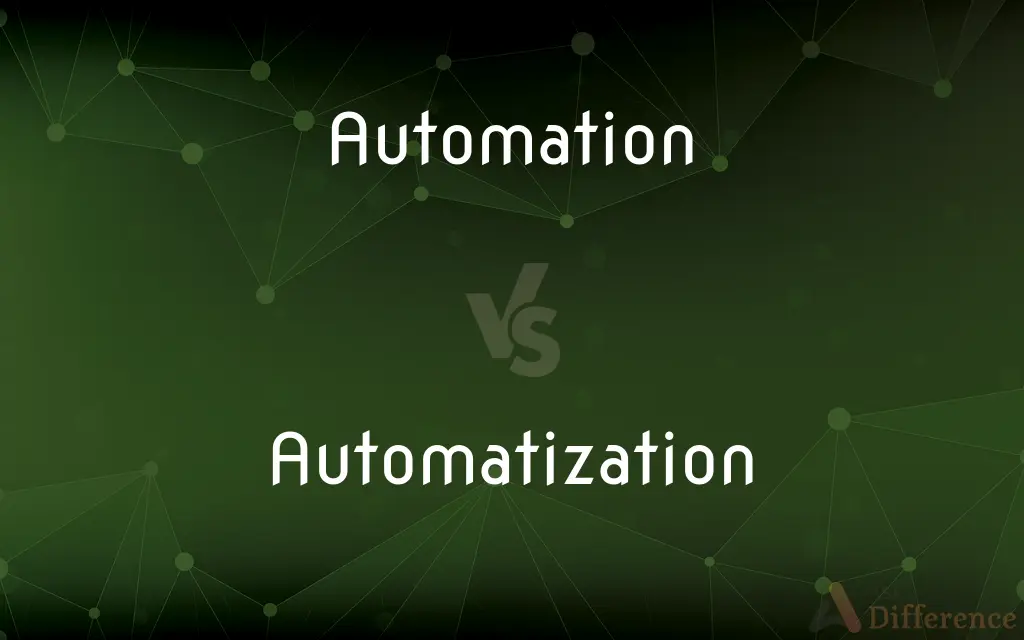Automation vs. Automatization — What's the Difference?
By Tayyaba Rehman — Updated on September 5, 2023
Automation refers to the use of technology to perform tasks, while automatization is the process of making an action automatic through repetition or learning.

Difference Between Automation and Automatization
Table of Contents
ADVERTISEMENT
Key Differences
Automation is primarily associated with the integration of machines, computers, and technology to handle tasks traditionally done by humans. This concept has been widely adopted across industries to boost efficiency, consistency, and productivity. On the other hand, automatization refers to the psychological process where, after ample practice, tasks become automatic and can be performed with minimal conscious effort.
In the context of technology and industry, automation often involves the use of robots, software, and sophisticated machinery. Automatization, while it can be applied to machinery, is more frequently used in cognitive psychology to describe the transition from conscious to automatic processing.
For instance, when you first learn to drive a car, you consciously think about every action. Over time, as you become more skilled, many driving tasks become automatized, and you can perform them without conscious thought. Contrastingly, automation would be akin to self-driving cars, where technology completely takes over the task of driving.
In summary, while both automation and automatization pertain to processes that reduce human intervention, automation is more about leveraging technology, and automatization relates to human cognitive processes and learning.
Comparison Chart
Definition
Use of technology to perform tasks.
Making an action automatic through learning or repetition.
ADVERTISEMENT
Primary Context
Technology and industry.
Cognitive psychology.
Examples
Robots in manufacturing, AI customer service.
Learning to drive, memorizing multiplication tables.
Requires Technology
Yes
Not necessarily.
Concerning Human Process
No
Yes
Compare with Definitions
Automation
The use of largely automatic equipment in a system or process.
The automation in modern car factories has reduced the need for manual labor.
Automatization
The process of making actions automatic through repeated practice or learning.
After years of practice, the musician's performance felt like automatization.
Automation
The application of technology to execute tasks without human intervention.
The factory introduced automation to increase production rates.
Automatization
The reduction of conscious thought in performing a task.
With enough practice, the act of tying a shoelace becomes an automatization.
Automation
A technique, method, or system of operating using automated processes.
The company's automation of its billing system saved hours of manual data entry.
Automatization
A mental state where actions are performed without intentional thinking.
For experienced drivers, changing gears becomes an automatization.
Automation
The state of being operated automatically.
With the rise of smart homes, automation is becoming a standard feature in modern houses.
Automatization
Achieving proficiency in a task to the point it feels automatic.
Mastery in any skill involves a high degree of automatization.
Automation
The system or method of controlling processes by automated means.
The new office building boasts a state-of-the-art automation system for lighting and HVAC.
Automatization
The transformation of a task such that it can be performed without conscious effort.
Through constant repetition, reading becomes an automatization for most people.
Automation
Automation describes a wide range of technologies that reduce human intervention in processes. Human intervention is reduced by predetermining decision criteria, subprocess relationships, and related actions — and embodying those predeterminations in machines.Automation, includes the use of various control systems for operating equipment such as machinery, processes in factories, boilers, and heat-treating ovens, switching on telephone networks, steering, and stabilization of ships, aircraft, and other applications and vehicles with reduced human intervention.Automation covers applications ranging from a household thermostat controlling a boiler, to a large industrial control system with tens of thousands of input measurements and output control signals.
Automatization
Automation.
Automation
The automatic operation or control of equipment, a process, or a system.
Automatization
The process of making an action of a higher animal reflexive.
Automation
The techniques and equipment used to achieve automatic operation or control.
Automatization
Automation.
Automation
The condition of being automatically controlled or operated.
Automation
The act or process of converting the controlling of a machine or device to a more automatic system, such as computer or electronic controls.
Automation
The act of implementing the control of equipment with advanced technology; usually involving electronic hardware;
Automation replaces human workers by machines
Automation
The condition of being automatically operated or controlled;
Automation increases productivity
Automation
Equipment used to achieve automatic control or operation;
This factory floor is a showcase for automation and robotic equipment
Common Curiosities
What is Automation?
Automation is the use of technology to perform tasks without human intervention.
How is Automatization different from Automation?
Automatization refers to tasks becoming automatic through repetition, while automation involves using technology.
Is Automatization always related to technology?
No, automatization often pertains to human cognitive processes and learning.
Is learning to play a musical instrument an example of Automatization?
Yes, as the musician practices, many actions become automatized.
Can a task be both automated and automatized?
Yes, driving is automatized for experienced drivers, but cars can also be automated with self-driving technology.
Does Automatization require technology?
Not necessarily, it often pertains to human learning.
Why is Automation important in industries?
Automation boosts efficiency, consistency, and productivity.
Does Automatization mean you no longer need to think about a task?
Generally, an automatized task requires minimal conscious effort.
Which industries benefit most from Automation?
Manufacturing, IT, and customer service are among many that benefit.
Is reading an example of Automatization?
For most people, reading becomes automatized after learning it in childhood.
Are robots the only form of Automation?
No, automation can also include software processes, machinery, and more.
What's an example of Automation in homes?
Smart thermostats that adjust the temperature based on learned patterns.
Can Automatization lead to skill mastery?
Yes, mastering a skill often involves a high degree of automatization.
Are there downsides to Automation?
Yes, such as potential job losses in certain sectors.
Can Automatization lead to forgetfulness?
Sometimes, as when actions are so automatic, people might not recall performing them.
Share Your Discovery

Previous Comparison
Lucidity vs. Lucidness
Next Comparison
Obstinancy vs. ObstinacyAuthor Spotlight
Written by
Tayyaba RehmanTayyaba Rehman is a distinguished writer, currently serving as a primary contributor to askdifference.com. As a researcher in semantics and etymology, Tayyaba's passion for the complexity of languages and their distinctions has found a perfect home on the platform. Tayyaba delves into the intricacies of language, distinguishing between commonly confused words and phrases, thereby providing clarity for readers worldwide.















































